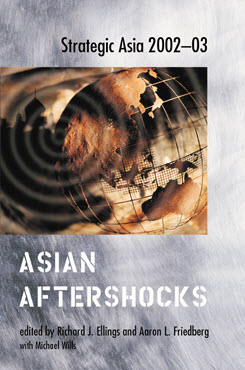Korea (Strategic Asia 2002-03)
Maintaining peace in Korea has been a high-maintenance, high-tension operation, and on more than one occasion over the past five decades it has seemed as if the mission might fail. Yet as was noted in last year’s Strategic Asia report, the security situation in the Korean Peninsula has seemed relatively calm of late—by any recent historical measure, quite uncharacteristically so—and that calm has held, extending the peninsula’s period of unusually clement diplomatic weather by another full year.
Despite the deep mutual hostility between the two Korean states, and the official programmatic commitment each maintains to the eradication of the other’s political system, a truce has held in the Korean Peninsula for almost half a century (thanks largely to the U.S.-ROK military alliance, codified in the 1953 Mutual Defense Treaty and instantiated in the 37,000 soldiers Washington still billets in the South, that has provided an indispensable element of deterrence in the peninsula’s military equation).
To be sure, maintaining peace in Korea has been a high-maintenance, high-tension operation, and on more than one occasion over the past five decades it has seemed as if the mission might fail. Yet as was noted in last year’s Strategic Asia report, the security situation in the Korean Peninsula has seemed relatively calm of late—by any recent historical measure, quite uncharacteristically so—and that calm has held, extending the peninsula’s period of unusually clement diplomatic weather by another full year.
Strategic Asia
The Strategic Asia annual edited volume incorporates assessments of economic, political, and military trends and focuses on the strategies that drive policy in the region. Learn more about Strategic Asia.


